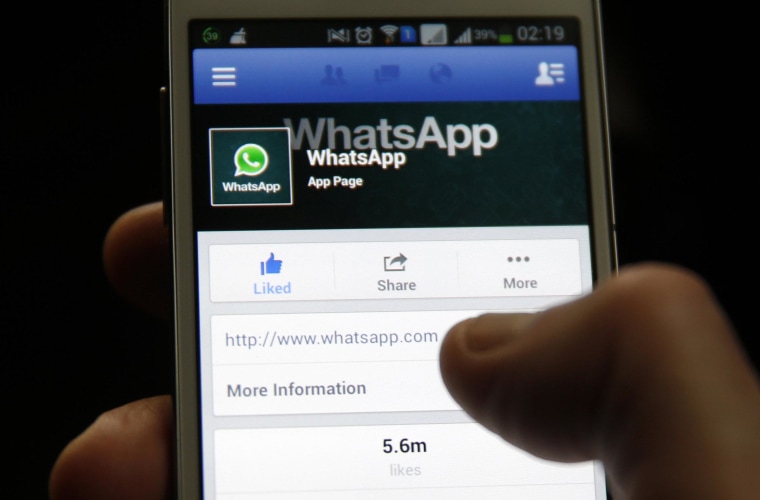Mobile messaging has long been a hot space in technology, and Facebook's jaw-dropping $16 billion acquisition of WhatsApp underscores the opportunity in this buzzy field.
WhatsApp -- which lets users send text, video and voice messages via Internet data instead of "charging" the messages to users' texting plans, even to international recipients -- and its dozens of competitors worldwide are capitalizing on big global trends in mobile. Facebook and others want to cash in.
"This WhatsApp deal even gets into the upper echelon of the biggest-ever business deals," said Brian Blau, the research director of consumer technologies at tech-focused research firm Gartner. "It shows just how seriously Facebook sees this space."
Here are four reasons mobile messaging is huge in tech right now:
Messaging apps as social networks. WhatsApp and its ilk -- China's WeChat and Japan's KakaoTalk, as well as Kik, Line and many more -- let people send each other texts, videos, photos and other content to connect one-on-one or as a group.
Sounds a little like Facebook, doesn't it?
"We call them messaging apps, but these are absolutely social networks," said Brent Iadarola, the global research director of mobile and wireless at Frost & Sullivan. "WhatsApp and other apps have grown this robust ecosystem, and Facebook clearly views that as a social network on a smaller scale."
The scale may be smaller in terms of the number of people connected in a given chat, but the amount of content shared is staggering. WhatsApp's users are uploading daily an average of 600 million photos, 200 million voice messages and 100 million video messages.
"WhatsApp may have a different type of user and a different type of usage scenario, but it's still core social," said Blau, the Gartner analyst. "You can easily see how WhatsApp fits into the Facebook story."
"We call them messaging apps, but these are absolutely social networks."
Massive opportunity in developing countries. WhatsApp may not be a household name in the United States, but the app is wildly popular overseas.
By acquiring WhatsApp, Facebook is essentially buying an immediate foothold into countries in Africa and Asia, where the number of smartphones is exploding -- compared with countries like the U.S., where the smartphone market is saturated.
"As people in these emerging markets get smartphones, they are going to be the future of monetization," Blau said. "It will take time to develop, but the potential opportunity is massive."
WhatsApp, which has a staggering 450 million users worldwide, is hardly the only such app taking advantage of that opportunity. Sequoia Capital, the only venture firm to invest in WhatsApp, published a blog post about partnering with the app in January 2011 -- when there were 16 social messaging apps in Botswana alone.
In Latin America, the mobile messaging boom is so huge that some countries are using the verb “guartsapear” to mean communicating through WhatsApp, according to the Wharton School at the University of Pennsylvania.
The average smartphone user worldwide spends more than 80 percent of their phone time on "non-voice activities."
Teens love it! In particular, it's non-U.S. teens who really love WhatsApp, according to GlobalWebIndex, a firm that conducts quarterly what it says is "the world's largest study on the digital consumer."
Jason Mander, GlobalWebIndex's head of trends, shared with NBC News research from a study to be published Friday. The study shows a whopping one out of every four teens worldwide was on WhatsApp as of the fourth quarter of 2013 -- a 160 percent rise from the first quarter of the year.
"The growth is absolutely dramatic, and teens are an important segment," Mander said. It's especially important for Facebook, which has battled perception that it has become less trendy among teens.
Global Web Index's teen data also reflects how popular WhatsApp is outside of North America. About 69 percent of teens ages 16-19 in the Middle East and Africa use the app, according to Global Web Index, compared to just 4 percent of North Americans of the same age.
Voice calls are passé. Phones really aren't for phone calls anymore. A PricewaterhouseCoopers report last year showed time spent on voice calls is declining in North America, and according to Frost & Sullivan, the average smartphone user worldwide spends more than 80 percent of their phone time on "non-voice activities."
"It's a huge shift in what we even consider the utility of a phone," said Iadarola of Frost & Sullivan.
But mobile app usage is growing quickly -- and messaging and social apps are the biggest driver of growth. A study last month from Flurry Analytics showed messaging app usage rose more than 200 percent last year, almost twice the overall mobile app growth of 115 percent.
Sequoia Capital, in its blog post, grandly called WhatsApp “part of a chain that over the past 150 years reaches from the pony express, telegraph and airmail letter to the telephone and email.”
